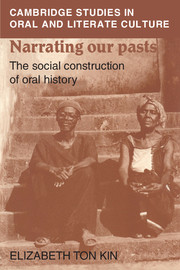Book contents
- Frontmatter
- Contents
- List of illustrations
- Acknowledgments
- Note on orthography
- Introduction
- 1 Jlao: an introductory case study
- 2 The teller of the tale: authors and their authorisations
- 3 Structuring an account: the work of genre
- 4 Temporality: narrators and their times
- 5 Subjective or objective? Debates on the nature of oral history
- 6 Memory makes us, we make memory
- 7 Truthfulness, history and identity
- Notes
- Bibliography
- General index
- Index of names
- Plate section
1 - Jlao: an introductory case study
Published online by Cambridge University Press: 05 June 2012
- Frontmatter
- Contents
- List of illustrations
- Acknowledgments
- Note on orthography
- Introduction
- 1 Jlao: an introductory case study
- 2 The teller of the tale: authors and their authorisations
- 3 Structuring an account: the work of genre
- 4 Temporality: narrators and their times
- 5 Subjective or objective? Debates on the nature of oral history
- 6 Memory makes us, we make memory
- 7 Truthfulness, history and identity
- Notes
- Bibliography
- General index
- Index of names
- Plate section
Summary
Introduction
I begin with an introductory case study. A historical portrait of Jlao, a small community in Liberia, sets the context for a discussion of the ways in which representations of pastness are produced there. I then look at the occasions on which past events are evoked, the qualifications of the tellers, and the genres in which they work. I conclude with an account of the histories of Sieh Jeto and his narrative art.
Anyone who makes comparisons from different languages or cultures faces the difficulty that audiences may need a lot of background knowledge if they are to appreciate why an example is significant. Insiders have this knowledge; it's the outsiders who have to make explicit what insiders take for granted. And it's a common paradox that the more knowledge you bring to data the richer your interpretation, the more new information you can elicit. Just because Jlao was a foreign culture to me, I had to bring together as many sources as I could to understand it: contemporary social detail from observation and informants, historical information from oral historians and conventional documents.
I have therefore to begin by offering an interpretation of the Jlao past which has been formed by the very practices that I wish to identify and discuss later in the book.
- Type
- Chapter
- Information
- Narrating our PastsThe Social Construction of Oral History, pp. 18 - 37Publisher: Cambridge University PressPrint publication year: 1992



